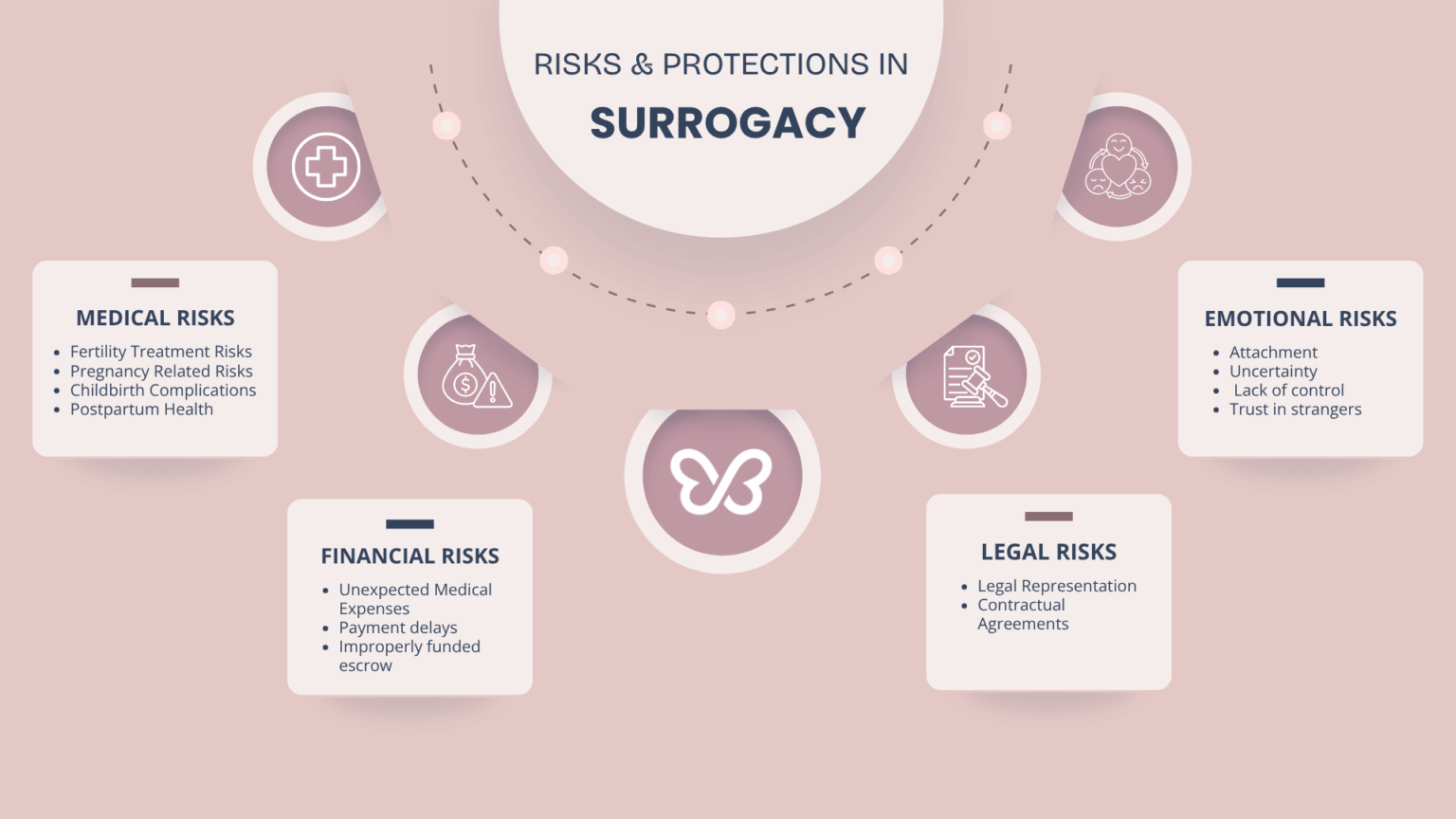
Surrogacy is one of the most meaningful paths to parenthood, offering hope to those who might not otherwise have the chance to build a family. However, it is important to recognize that surrogacy, like any major medical and legal undertaking, carries risks. No pregnancy is ever fully guaranteed, and both the gestational carrier and the intended parents take on different kinds of challenges throughout the journey.
For surrogates, risks often come in the form of medical procedures, the physical demands of pregnancy, additional stress of the process, medical bills and the recovery period after birth.
Intended parents face uncertainties of a different kind, such as the financial cost, the possibility of setbacks, and the emotional toll of waiting and hoping for a successful outcome.
By understanding these risks before beginning, families can prepare themselves with knowledge, support, and the right professionals to guide them.
A Real Story from a Surrogate
In one of our recent webinars, surrogate Darlene Arola shared her personal journey and the challenges she faced along the way. While her experience with a former agency started out smoothly, she soon encountered both unexpected financial concerns and difficult medical decisions during pregnancy.
Her reflections show how important it is for surrogates to have strong contracts, reliable agency support, and clear medical guidance.
Darlene’s story is both inspiring and eye-opening, and we encourage you to hear it in her own words. You can watch the full webinar on surrogacy risks and protections here:
Health Risks of Surrogacy
Fertility Treatment Risks
The surrogacy process starts with fertility treatments for the gestational carrier. She takes hormonal medications to prepare her body for embryo transfer. These medicines help regulate her cycle and make the uterus ready to receive an embryo.
Fertility treatments are generally safe, but they can cause mild side effects such as mood swings, bloating, tiredness, or headaches. In rare cases, an egg donor may develop ovarian hyperstimulation syndrome (OHSS), which can cause abdominal pain or fluid buildup and needs medical care.
Fertility specialists monitor every step of the process. Still, it’s important to recognize that these treatments can take a physical and emotional toll.
Pregnancy-Related Risks
Every pregnancy carries risk, and surrogacy is no different. A surrogate may experience miscarriage, ectopic pregnancy, or complications such as gestational diabetes and preeclampsia. When more than one embryo is transferred, the chances of carrying twins or triplets increase, which adds additional strain to both the surrogate and the developing babies. Surrogates are carefully screened for health and fitness before being matched, but even healthy women can experience complications during pregnancy. Regular monitoring helps identify and manage these risks, but they cannot be entirely removed.
Childbirth Complications
Childbirth is unpredictable, and no amount of preparation can guarantee a complication-free delivery. Some surrogates deliver vaginally without significant issues, while others may require a planned or emergency cesarean section. C-sections come with their own risks, such as infection, heavy bleeding, or longer recovery times. Even vaginal deliveries may result in complications such as tearing or the need for medical intervention during labor. These realities highlight why access to excellent medical care throughout pregnancy and delivery is so essential in a surrogacy arrangement.
Postpartum Health
The physical and emotional journey does not end with the delivery of the baby. Postpartum recovery can be difficult for some surrogates, particularly if they have undergone a surgical birth. Infections, lingering discomfort, and hormonal changes may affect recovery. Emotional changes can also arise, and some surrogates may experience postpartum depression or sadness as they adjust to no longer being pregnant. With proper medical care, mental health support, and open communication with their agency and intended parents, surrogates can feel cared for and supported during this critical stage.
Emotional Risks of Surrogacy
For the Surrogate
Pregnancy itself is an emotional experience, and carrying a child for another family brings unique challenges. Even with preparation and counseling, some surrogates may feel disappointment in expectations vs. reality of the relationship with the intended parents, the lack of participation from the intended parents at birth, and the birth/postpartum experience they expected. Hormonal changes can intensify these emotions, making it more difficult to process them alone. Many surrogates also navigate the emotional challenge of balancing their own family life while fulfilling their role for the intended parents. These risks are not insurmountable, but they require sensitivity and professional support.
For Intended Parents
Intended parents often describe the surrogacy journey as both hopeful and stressful. They are entrusting their dream of a child to another person, which can feel overwhelming. The wait for updates, the fear of complications, and the possibility of setbacks such as miscarriage or failed transfers can weigh heavily on them. For parents who have already endured infertility struggles, the emotional impact of these uncertainties can feel even more difficult. It is important to recognize this side of the journey and prepare for it with resilience and support systems in place.
Why Support Matters
Both surrogates and intended parents benefit greatly from counseling and emotional support, education and mediations. Agencies like SurrogateFirst provide access to professionals who understand the specific emotional challenges of surrogacy. Support groups also allow surrogates and parents to connect with others who have experienced similar journeys. These resources can help reduce feelings of isolation, strengthen coping strategies, and provide comfort when difficult moments arise.
Legal Risks of Surrogacy
To reduce legal risks, both surrogates and intended parents need their own lawyers. Having independent legal representation ensures that everyone’s rights are protected and that all expectations are clear from the start.
The most important legal documents in the surrogacy process are the Gestational Carrier Agreement (GCA) and the Pre-Birth or Post-Birth Order (PBO). These agreements set clear guidelines for everyone involved and provide strong protection throughout the journey.
It’s best to work with an attorney who specializes in reproductive law, is part of the American Academy of Adoption and Assisted Reproduction Attorneys (AAAA), and is licensed in the state where the gestational carrier lives. If that’s not possible, an attorney licensed in the state where the embryos or intended parents are located can serve as an alternative, especially for more complex cases.
You can read more in our dedicated guide on surrogacy contracts.
Financial Risks of Surrogacy
For Intended Parents
Surrogacy requires a significant financial commitment. The total cost often ranges between $1600,000 and $250,000, depending on medical treatments, agency fees, legal support, and surrogate compensation. There is always the possibility that an IVF cycle will fail, requiring another attempt and adding to the overall cost. Unexpected medical needs during pregnancy, such as hospitalization or bed rest, may also increase expenses. For intended parents, these financial risks can add stress to an already emotional journey.
For Surrogates
Although intended parents cover medical expenses and surrogate compensation, surrogates still face risks if they work with an unreliable agency or without a clear legal contract. Payment delays, disputes, or confusion about what is covered can create unnecessary stress. This is why working with a reputable agency that prioritizes transparency is so critical. To better understand how expenses are structured, we recommend reading our detailed article on the surrogacy process and payment breakdown. If you are comparing the financial commitment of surrogacy overall, our guide on surrogacy cost provides a comprehensive overview.
How to Minimize Risks in Surrogacy
Medical Guidance
The best way to reduce medical risks is to work with experienced fertility clinics and follow their recommendations closely. Regular monitoring, careful embryo transfer protocols, and personalized treatment plans help ensure both the surrogate and the baby are as safe as possible.
Legal Protection
Strong contracts created by reproductive law experts are a key safeguard. These agreements protect the surrogate, the intended parents, and ultimately the child by making responsibilities and expectations clear from the very beginning.
Emotional Support
Counseling and support groups provide safe spaces for surrogates and intended parents to share feelings, ask questions, and prepare for challenges. This kind of support helps families feel less alone and more resilient throughout the process.
Choosing the Right Agency
The single most effective way to minimize risks is to work with a trusted surrogacy agency. SurrogateFirst provides comprehensive medical, legal, emotional, and financial safeguards. By guiding families every step of the way, we reduce risks and create a smoother, more supported journey for both surrogates and intended parents.
How Can SurrogateFirst help reduce the Risk?
At SurrogateFirst, we believe transparency is one of the most important parts of the surrogacy process. When families understand both the rewards and the challenges, they are in the best position to move forward with confidence.
At SurrogateFirst, our philosophy has always been to put the surrogate first. We believe that when the well-being of the gestational carrier is prioritized, the entire surrogacy process becomes safer and more positive for everyone involved. We provide thorough screening, transparent financial processes, and legal partnerships with reproductive law experts. Our dedicated support team ensures that surrogates and intended parents feel cared for at every stage.
Surrogacy does involve risks, but with the right preparation and the right team, those risks can be minimized. Families can then focus on what truly matters: the joy of welcoming a child into their lives. At SurrogateFirst, we are proud to help families achieve that dream, one blessing at a time.
Why SurrogateFirst?
At SurrogateFirst, we’re more than a matching agency—we’re your support system.
- Compassionate, personalized matching
- 24/7 access to dedicated case managers
- Legal and medical coordination
- Transparent pricing
- Emotional support for surrogates and for intended parents alike






